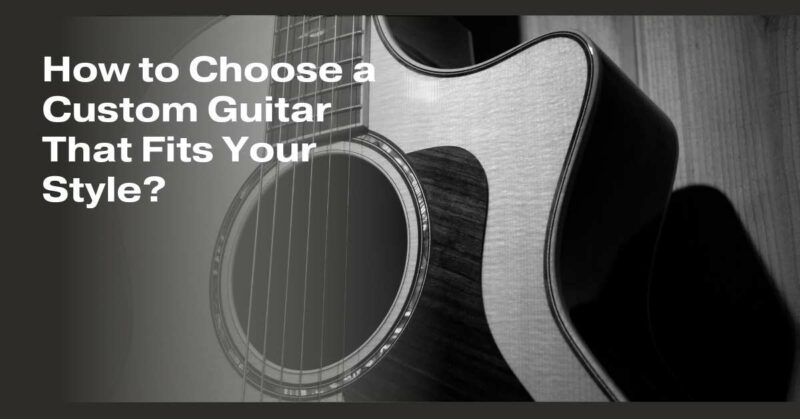Choosing a custom guitar that fits your style involves a combination of understanding your musical preferences, identifying the features and specifications that matter most to you, and working closely with a luthier or guitar builder to create the instrument of your dreams. Here’s a step-by-step guide to help you select a custom guitar that aligns with your unique style:
1. Define Your Musical Style and Goals:
Before you start the customization process, have a clear understanding of the musical style(s) you want to play and your specific goals. Consider factors like:
- Genre: Are you primarily interested in rock, jazz, blues, classical, folk, metal, or another genre?
- Playing Technique: Do you predominantly use fingerstyle, flatpicking, or other techniques?
- Tonality: What kind of tone and sound are you looking for? Bright, warm, mellow, aggressive, etc.?
- Performance Setting: Will you mainly play in a studio, on stage, or at home?
2. Identify Your Guitar Preferences:
Think about the specific features and characteristics you desire in a custom guitar. Some aspects to consider include:
- Body Style: Choose a body style (e.g., dreadnought, concert, jumbo, archtop) that suits your playing style and tonal preferences.
- Tonewoods: Select the tonewoods for the top, back, and sides of the guitar. Different woods offer various tonal qualities. For example, spruce is bright and articulate, while mahogany is warm and balanced.
- Neck Profile: Determine the neck profile (e.g., C-shaped, V-shaped, slim, chunky) that feels comfortable in your hand.
- Scale Length: Decide on the scale length (e.g., 25.5 inches, 24.75 inches) that suits your playing style and comfort.
- Fingerboard Material: Choose the fingerboard material (e.g., rosewood, ebony, maple) that you prefer for playability and aesthetics.
- Inlays and Bindings: Customize the guitar’s visual elements, such as inlays, bindings, and rosettes, to reflect your personal style.
- Finish: Decide on the finish type (e.g., gloss, satin) and color that you find visually appealing.
- Hardware: Choose the hardware, including tuners, bridge, and pickups (if applicable), that complements your style and performance needs.
3. Set a Budget:
Determine your budget for the custom guitar. Custom instruments can vary widely in price based on the level of customization and craftsmanship. Be clear about your budget constraints and communicate them to the luthier or builder.
4. Find a Reputable Luthier or Builder:
Research and identify experienced and reputable luthiers or guitar builders who specialize in custom instruments. Read reviews, seek recommendations from fellow musicians, and view their previous work to assess their skills and craftsmanship.
5. Collaborate and Communicate:
Work closely with the luthier or builder to convey your preferences, needs, and vision for the custom guitar. Effective communication is crucial to ensure the final instrument aligns with your style.
6. Test Playability:
Once the custom guitar is built, test its playability and tone thoroughly. Play a variety of songs and techniques to ensure it meets your expectations.
7. Fine-Tune and Adjust:
Custom guitars may require some fine-tuning and adjustments after delivery. Collaborate with the luthier to address any minor tweaks or changes needed to perfect the instrument.
8. Personalize Your Guitar:
Consider personalizing your custom guitar with unique features or engravings that make it truly yours. This adds a personal touch and can enhance your connection with the instrument.
9. Invest in a Quality Case:
Protect your custom guitar with a high-quality case that offers adequate protection during storage and transportation.
10. Enjoy Your Custom Guitar:
Once your custom guitar is complete and meets your specifications, enjoy making music with it. Your personalized instrument should enhance your playing experience and inspire your creativity.
Choosing a custom guitar is an exciting and creative process. By carefully considering your musical style, preferences, and working closely with a skilled luthier or builder, you can create a custom guitar that not only fits your style but also becomes an extension of your musical identity.


